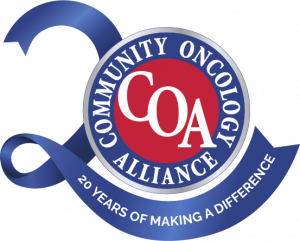COA Survey Shows Majority of Practices Not Currently Planning to Participate in Enhancing Oncology Model
EOM’s Unpredictability and Immediate Risk Cited as Main Factors for Non-Participation by Practice Respondents
WASHINGTON, D.C., UNITED STATES, June 6, 2023/EINPresswire.com/ -- A survey of practices by the Community Oncology Alliance (COA) shows that the majority of independent practices are not planning to participate in the upcoming Enhancing Oncology Model (EOM), with significant concerns over the unpredictability of the model and risks faced by practices. The results raise serious questions about the potential success of the EOM ahead of next month’s launch of this new federal payment reform model for cancer care being led by the Center for Medicare and Medicaid Innovation (CMMI).The COA survey gathered responses from 137 oncology practices across the United States. 61 percent (83 practices) of the respondents had participated in the Oncology Care Model (OCM), the previous CMMI oncology payment reform model. The majority of total survey respondents (91 practices or 71 percent of respondents) indicated that they would not be participating in the EOM. 64 percent (88 practices) of the respondents submitted an EOM letter of intent to CMMI; however, only 29 percent (40 practices) actually plan to participate.
- Click here to access the full EOM practice survey results.1
When asked why they were not participating in the EOM, practices identified several key aspects of the model that remained a concern. The top reasons practices listed included immediate entry into 2-sided risk arrangements, unpredictability of the EOM and drug prices, and inadequate Monthly Enhanced Oncology Services (MEOS) payments in a model that requires practices to do more but receive less compensation. Without a stable model or the willingness of CMMI to absorb some of the risk while practices get acclimated to participation, in addition to low reimbursement rates, practices indicated they will not take the chance of hurting their operations.
On a more positive note, the practices who will participate in the EOM (31 percent) indicated that participating in the model positions them for success in other value-based care models from other payers; makes them a leader in payment reform; provides a framework to provide quality cancer care; they experienced financial success during the OCM and expect the same during the EOM; and gives them a seat at the CMMI table.
Practices who plan to participate and those that do not have both identified several areas where they would like to see improvements made to the EOM. Practices participating in the EOM indicated that they would like to see making two-sided risk optional or phased in, increased transparency around episode target prices, and improved intervals between CMMI feedback reports. Practices not planning to participate indicated that they would like to see increased MEOS payments (to a minimum of $150); allowing the option of one year of one-sided risk; and eliminating the downside risk option.
COA previously conducted a survey of practices on potential EOM participation in July 2022, and numbers have only gotten worse since that time. The high barrier to entry, significant investments, extreme complications, limited MEOS payments, and high financial risk all remain obstacles for independent community practices who wish to participate in the EOM.
“Value-based care is the future of health care, and community oncology practices are eager to bring the latest and greatest care to their patients,” said Judith Alberto, MHA, RPh, BCOP, COA director of clinical initiatives. “However, practices cannot do this when the barrier to entry and cost of participation potentially endangers the quality of care they provide, as well as the future stability of the practice.”
“The COA survey should serve as a red alert to CMS and CMMI that the success of the EOM is at risk,” said Shiela Plasencia, COA director of practice support. “While it is good that some practices are predicting success in the EOM, that is far from certain. Unfortunately, the downside risk to practices, should this model go wrong, is far too great. CMMI must address the concerns of the majority of practices to ensure widespread success.”
The online survey was conducted from May 1 to May 19, 2023, and included 15 questions. 137 practices responded to the survey, with 118 of the respondents being private community practices. Answers were anonymously collected and analyzed by COA’s practice support team. Support for the EOM survey was provided by Janssen Oncology.
COA remains dedicated to oncology payment reform, especially the Medicare program, which is the dominant payer of cancer care. Hopefully, CMMI can make changes to convince more oncology practices to participate in this important model.
Access the full survey results here.2
###
About the Community Oncology Alliance: The Community Oncology Alliance (COA) is a non-profit organization dedicated to advocating for community oncology practices and, most importantly, the patients they serve. For more than 20 years, COA has been the only organization dedicated solely to community oncology where the majority of Americans with cancer are treated. The mission of COA is to ensure that patients with cancer receive quality, affordable, and accessible cancer care in their own communities. More than 5,000 people in the United States are diagnosed with cancer every day and deaths from the disease have been steadily declining due to earlier detection, diagnosis, and treatment.
Drew Lovejoy
Community Oncology Alliance
info@coacancer.org
1 https://mycoa.s3.amazonaws.com/1686058629958_COA-EOM-Survey-Results-06-06-2023-final.pdf
2 https://mycoa.s3.amazonaws.com/1686058629958_COA-EOM-Survey-Results-06-06-2023-final.pdf

